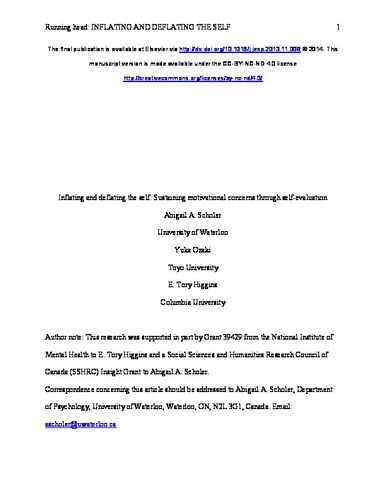| dc.contributor.author | Scholer, Abigail A. | |
| dc.contributor.author | Ozaki, Yuka | |
| dc.contributor.author | Higgins, E. Tory | |
| dc.date.accessioned | 2018-02-02 17:53:10 (GMT) | |
| dc.date.available | 2018-02-02 17:53:10 (GMT) | |
| dc.date.issued | 2014-03-01 | |
| dc.identifier.uri | http://dx.doi.org/10.1016/j.jesp.2013.11.008 | |
| dc.identifier.uri | http://hdl.handle.net/10012/12989 | |
| dc.description | The final publication is available at Elsevier via http://dx.doi.org/10.1016/j.jesp.2013.11.008 © 2014. This manuscript version is made available under the CC-BY-NC-ND 4.0 license http://creativecommons.org/licenses/by-nc-nd/4.0/ | en |
| dc.description.abstract | The ways in which individuals think and feel about themselves play a significant role in guiding behavior across many domains in life. The current studies investigate how individuals may shift the positivity of self-evaluations in order to sustain their chronic or momentary motivational concerns. Specifically, we propose that more positive self-evaluations support eagerness that sustains promotion-focused concerns with advancement, whereas less positive self-evaluations support vigilance that sustains prevention-focused concerns with safety. The current studies provide evidence that self-evaluation inflation is associated with promotion concerns whereas self-evaluation deflation is associated with prevention concerns, whether regulatory focus is situationally manipulated (Studies 1, 2b, and 3) or measured as a chronic individual difference (Study 2a). Following regulatory focus primes, individuals in a promotion focus showed relatively greater accessibility of positive versus negative self-knowledge compared to individuals in a prevention focus (Study 1). In an ongoing performance situation, participants in a promotion focus reported higher self-esteem than participants in a prevention focus (Studies 2a and 2b). Finally, individuals in a promotion focus persisted longer on an anagram task when given an opportunity to focus on their strengths versus weaknesses, which was not the case for individuals in a prevention focus (Study 3). Across studies, the predicted interactions were consistently obtained, although sometimes the effects were stronger for promotion or prevention motivation. We discuss implications for existing models of the motives underlying self-evaluation. | en |
| dc.description.sponsorship | National Institute of Mental Health [grant 39429] to E. Tory Higgins | en |
| dc.description.sponsorship | Social Sciences and Humanities Research Council of Canada (SSHRC) Insight Grant to Abigail A. Scholer | en |
| dc.language.iso | en | en |
| dc.publisher | Elsevier | en |
| dc.rights | Attribution-NonCommercial-NoDerivatives 4.0 International | * |
| dc.rights.uri | http://creativecommons.org/licenses/by-nc-nd/4.0/ | * |
| dc.subject | Motivation | en |
| dc.subject | Prevention Focus | en |
| dc.subject | Promotion Focus | en |
| dc.subject | Regulatory Fit | en |
| dc.subject | Regulatory Focus | en |
| dc.subject | Self-Evaluation | en |
| dc.subject | Self-Regulation | en |
| dc.title | Inflating and deflating the self: Sustaining motivational concerns through self-evaluation | en |
| dc.type | Article | en |
| dcterms.bibliographicCitation | Scholer, A. A., Ozaki, Y., & Higgins, E. T. (2014). Inflating and deflating the self: Sustaining motivational concerns through self-evaluation. Journal of Experimental Social Psychology, 51, 60–73. https://doi.org/10.1016/j.jesp.2013.11.008 | en |
| uws.contributor.affiliation1 | Faculty of Arts | en |
| uws.contributor.affiliation2 | Psychology | en |
| uws.typeOfResource | Text | en |
| uws.peerReviewStatus | Reviewed | en |
| uws.scholarLevel | Faculty | en |


